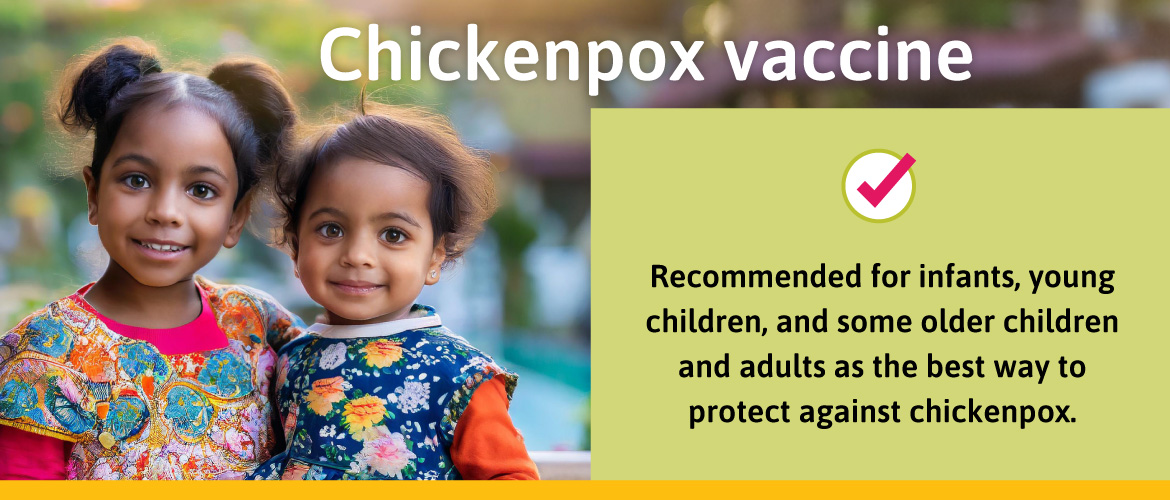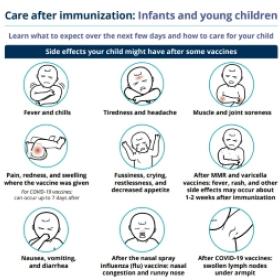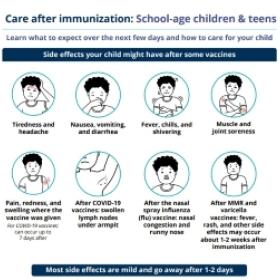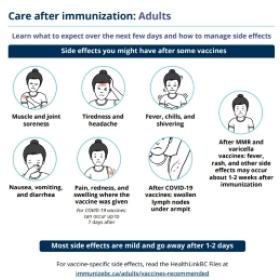On this page:
Available in 简体中文 (Simplified Chinese), 繁體中文 (Traditional Chinese), یسراف (Farsi), 한국어 (Korean), ਪੰਜਾਬੀ (Punjabi), and other languages.

Disease it protects against
- Chickenpox (varicella)
Did you know?
Children with chickenpox can have on average 350 red, itchy blisters. Infection in newborns, teenagers, adults, pregnant women and those with weakened immune systems is more severe.
Who should get the vaccine
| Age | Schedule |
|---|---|
| Infants & young children |
|
| School-age children & teens |
|
| Adults |
|
Chickenpox can be serious
Chickenpox is usually a mild disease. But in some cases, it can cause serious problems, such as pneumonia (lung infection), encephalitis (swelling of the brain), and bacterial infections of the skin. It doesn’t happen often, but people can die from chickenpox.
What if I or my child have had chickenpox disease?
- They had chickenpox disease before 2004 or
- The disease was confirmed by a lab test.
Did you know?
Before the chickenpox vaccine was available, 1500 to 2000 chickenpox-related hospitalizations occurred every year in Canada.
Safety
Vaccines are very safe
Getting the vaccine is much safer than getting one of the diseases.
Side effects
- Soreness, redness and swelling where the vaccine was given.
- Mild fever and a rash, which looks like chickenpox but with fewer spots, can occur about 2 weeks after the vaccine.
How to manage side effects
Who should not get the vaccine
- Have had a life-threatening reaction to a previous dose of the chickenpox vaccine, or any part of the vaccine, including neomycin or gelatin.
- Have an immune system weakened by disease or medical treatment.
- Have had a blood transfusion or received other blood products within the past 12 months.
- Have active untreated tuberculosis.
- Are pregnant or planning to become pregnant. People should avoid becoming pregnant for 1 month after getting the chickenpox vaccine.
Is it better to get chickenpox disease than the vaccine?
- Complications from chickenpox can be serious and can occur in any person who develops chickenpox, although they are more common in babies, teenagers, adults, pregnant women and those with weakened immune systems.
- Complications from chickenpox can include pneumonia (lung infection), encephalitis (swelling of the brain), and bacterial infections of the skin. It doesn’t happen often, but people can die from chickenpox.
- Rarely, infection early in pregnancy can result in a baby being born with birth defects. This is known as congenital varicella syndrome. Chickenpox can also cause miscarriage or stillbirth.
Chickenpox disease quick facts
- What is chickenpox?
-
Chickenpox is an infection caused by the varicella-zoster virus.
- How does chickenpox spread?
-
It spreads easily through the air when an infected person coughs or sneezes. You can become infected when you breathe in this air or touch contaminated surfaces. The virus may spread through contact with an infected person's saliva, such as by sharing food, drinks or cigarettes, or by kissing. It also spreads through contact with the fluid from chickenpox or shingles blisters.
- What are the symptoms?
-
Symptoms of chickenpox may include fever, aches, tiredness, headache and loss of appetite. A few days later, a rash appears. Red spots appear first on the face and scalp and then spread quickly down the body and to the arms and legs. The spots become very itchy and begin to look like blisters filled with clear fluid. After another few days, the fluid becomes cloudy, the blisters break, and a crust or scab forms while the skin heals. During this time, new "crops" of spots appear, form blisters, and then crust over. Chickenpox usually lasts about 10 days.
- What are the risks of the disease?
-
Complications from chickenpox include:
- Pneumonia (lung infection).
- Encephalitis (swelling of the brain).
- Bacterial infections of the skin.
Rarely, infection early in pregnancy can result in a baby being born with birth defects. This is known as congenital varicella syndrome. Babies may have a low birth weight, scars and problems with their limbs, eyes and brain. Chickenpox can also cause miscarriage or stillbirth.For some people, the virus can become active again later in life and cause a painful rash called shingles.







